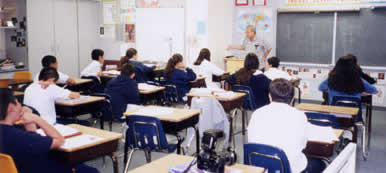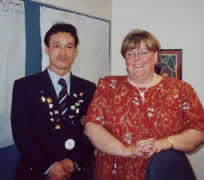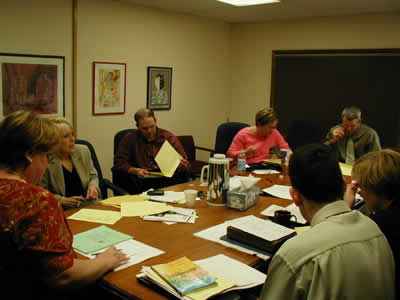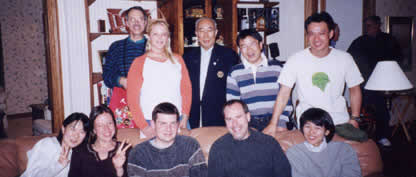
Official
Osaka Board of Education
Sponsored by the Osaka-Nakanoshima Rotary Club
Introduction
I recently had the privilege of traveling to Milwaukee, Wisconsin (D-6270)
in the United States as a member of the D-2660 GSE team under the sponsorship
of the Osaka-Nakanoshima Rotary Club. Of course, before participating in this
program, I knew that there was an organization called the Rotary Club, but I
didn't know much at all about what the Rotary actually does. This trip was a
precious opportunity for me (and also my first such experience) to understand
the Rotary's activities and philosophy. As a result of this trip, I was made
to think deeply about many different things.
I work at the Board of Education, which is located in Osaka City Hall, and
I deal with personnel issues related to horticulture and gardening class instructors
employed in the public schools of Osaka. Even though I say "instructors,"
I deal with many people who are not actually instructors.
At work, I am mainly in charge of personnel issues related to these non-instructors, and in this regard, one of the main reasons for my participating in the GSE program was to learn about the working conditions of American teachers and about how schools in the United States are operated.
My Impressions of America
As you know, America can be said to be one of the foreign countries we Japanese
are most familiar with, but America is such a huge country. And it is made up
of people from so many different ethnic backgrounds. Each region has its own
unique qualities and characteristics, giving completely different impression
of America. Actually, this trip was my sixth trip to the United States, but
it was a fresh and new experience for me. In my report, I would like to touch
on my feelings about the various people I met while in the Milwaukee area and
the places I visited, and to also mention various things I experienced and the
things I saw and heard during my vocational research.

Dinner with a host family(Port Washington, at the Didierat home)
(1) Economic conditions
Right now, the economy in the U.S. is experiencing a mild recession, and it
is clearly in decline. Of course, many of the Rotarians I met are in management
or are active in the business world, and maybe Americans are generally up on
stock investment and trust funds, etc. (so called financial technology-related
activities), but I was deeply impressed by the fact that many of the people
I met during my time in Wisconsin were very much interested in economic matters.
We attended a number of Rotary club meetings, and without fail at least one
person who made some comments to me mentioned that day's stock prices, so I
could see how interested American people are in the economy. Sometimes I did
meet people who, during discussions about economic matters, kind of shied away
and treated the topic coolly. In other words, they felt things weren't going
so well economically. But looking at the unemployment rate nationwide, it is
actually quite low. The unemployment rate at one place I visited (Waukesha)
was just 3%, which is pretty low. I think it is only natural that conditions
vary from place to place in such a large country, but I did wonder why things
were so stable in America.
I heard from some people while I was in Wisconsin that while its especially
high tax rate helps to prevent a population influx, even in America the high
educational standards tend to draw parents who are very serious about their
children's education, and the state government policy is effectively bringing
about a change from manufacturing-centered industries to information technology-
and biotechnology-related industries. In America, which is even stricter than
Japan when it comes to the importance placed on educational background, advanced
education is a very valuable asset. This is not the only reason, but I couldn't
help feeling that in Wisconsin, the high level of education is contributing
to the economic stability there.
(2) Multi-ethnic nation
It has been said that America is a melting pot, a "racial mosaic,"
and it is certainly true that there are many ethnic backgrounds in America.
But, there are many problems associated with the so-called immigrant "newcomers."
For example, (this is unthinkable for Japan, but) a number of the schools I
visited provide special classes for those who do not speak English (their classes
were conducted in the various mother tongues of the students attending). Many
of these students are from Central and South America, so Spanish was used in
their classes. Because they are living in homes that use Spanish only, their
progress in English is very slow. For this reason they are in these special
classes. Since children adapt quickly, though, they eventually move from classrooms
that use both English and Spanish to classrooms that only use English. This
does, however, involve a good bit of work on the part of the teachers, and some
classes with less than 20 students have two teachers in the classroom at all
times to teach in both languages. It was a very valuable experience for me to
be able to see with my own eyes something that we can hardly ever see here in
Japan, and I was deeply touched by the American approach to public education
and how children who present a variety of educational problems are not just
cast aside.

A class being given in Spanish at the Whiterock Elementary School(Waukesha)
Vocational Study Trips
During my vocational study trips, I predominantly visited educational institutions
and boards of education. I was blessed with many opportunities to talk to personnel
managers and education board chairmen about the local education systems, and
personnel- and labor-related matters. Sometimes I was even able to meet with
school administrators and talk about the education system.

With the Pewaukee region Board of Education chairman(Hartland-Lake County)
(1) American education
The American education system involves kindergarten through senior high school
education, and kindergarten is treated as a part of the children's elementary
school education. In Japan, the education system generally consists of 6 years
of elementary school, 3 years of junior high school and 3 years of high school.
In general (there were some exceptions), the school districts I visited, however,
had 5 years of elementary school (1st through 5th grade), 3 years of junior
high school (6th through 8th grade) and 4 years of high school (9th through
12th grade), with the school year divided into two semesters.
Also, the students have a very long summer vacation that runs for about 3 months
(from the second week of June to the first week of September), and during this
time the teachers do not have to work. Teachers are given 10 days of paid leave
for sick days, etc., but they have a very long break in the summer. As in Japan,
teachers who graduate from universities that are not specifically geared for
education must take a licensing test after completing a period of student teaching.
If they pass this test, they are able to work as teachers. However, depending
on the state, some teachers are under obligation to go for a master's degree
in education while they are working, either during the summer months or at night
school. This degree is directly related to their license renewal and to salary
increases. Teachers are treated well in America, but they do have a rather hard
schedule.
(2) Education boards, decision-making, etc.
The board of education I visited was a rather small one. There was the chairman
and personnel director, the budget director, and less than 10 others. To be
sure, compared to Osaka City, with its population of 2 million, there can be
no real comparison, but with 10 school districts with elementary, junior and
senior high schools, I couldn't hide my surprise at the fact that there were
only 12 or 13 people in attendance at that meeting. Also, regarding the negotiations
between the board of education and the teachers' union, it seemed that the main
point of contention between the board and the teachers (and technicians, secretaries,
etc.) had to do with health insurance. In recent years, continually increasing
health insurance costs have put constant strain on the board of education's
budget, and the board (who has to bear the burden of these costs) is struggling
over what to do about this problem. I was impressed by how different things
are in America compared to Japan, where everyone has national health insurance.
By the way, at the board of education I visited, personnel changes, in principle,
do no exist. This is completely different than here in Osaka. In addition, I
was surprised to hear that whenever a school district plans to do something
that is not in the operating budget (such as construction work or buy new personal
computers for the school, etc.), the board will do nothing without first determining
the will of the local citizens through a referendum. If the citizens agree to
the planned spending, their residence taxes will increase by several hundred
dollars per year for several years to pay for the increased spending. Of course,
if the citizens vote "no" to the proposed spending, the board will
either cancel or postpone the proposal, or raise the necessary money by cutting
personnel costs, etc. In such a case, the result of their decision is borne
by the citizens who previously either agreed or disagreed with the proposed
spending. In either case, it is a thoroughly rational system that goes directly
to the people and explains the importance of the proposed spending. I felt that
I had seen one aspect of America's mature society.

At a meeting of the Pewaukee Board of Education
Our Presentations
Even in Japan, I do not have much opportunity to speak in front of a large
number of people, and of course it was the first time for me to speak before
people in English. It took quite a bit of time for me to prepare for it. All
of the team members met together many times before departure, and everyday was
spent trying to figure out by trial and error how to ensure that our presentations
would turn out well. And, even after we settled down a little bit, we were all
worried that when we actually had to stand up in front of everyone and speak
in English, our nerves would get the best of us and we wouldn't be able to say
what we had intended to say.
Our first presentation was at the Geneva Hotel in a resort town, and it was
part of the program at the district conference. All of us were quite nervous
on the day of our presentation since it was such a big gathering. Things actually
didn't go exactly as planned, but when we were finished, everyone gave us a
warm round of applause, and we were so satisfied with the result that we even
talked about putting in some ad-lib stuff the next time we gave our presentations!
From the second time on, my ad-lib parts were related to something I like a
lot - baseball. In my self-introduction, I said that I was a "baseball-aholic"
and a rabid Hanshin Tigers fan. In Wisconsin, they have the historic Milwaukee
Brewers baseball team that plays at the newly-constructed, retractable-roof
dome, Miller Park. Unfortunately, for the last 20 years, their standing has
been low. Hanshin is doing very poorly right now, too, and when I said that
they were just like the Brewers, it drew laughs from the audience. Later, a
number of people came up to me to talk about Japanese baseball, and we had a
very lively discussion. It was then that I realized that even though we are
from different countries, the way people think isn't really all that different.
From that time on, I worked hard to relate to the people I met in the same way
as I would talking to friends and acquaintances here in Japan, and there were
often times when I felt the people I was talking to and I could truly identify
with each other.
It seems to me that there were many ways in which the pleasure of going to a
foreign country and relating to the local people, feeling the differences between
cultures, and the way we think and feel about things are not really related
to the language we speak and are not so different. It was not only during our
presentations, but also many times afterwards, that I had the same thought.
This is one of the many valuable experiences I was able to have by participating
in the GSE program, and even now the impression remains strong.

At a home party hosted by GSE Hosting Committee Co-Chairman, Gary Olsen where
we had a reunion with the members of the D-6270 GSE team
In Conclusion
I am grateful to the Osaka-Nakanoshima Rotary Club for sponsoring me and allowing
me to take part in this GSE program, and for their support and encouragement.
I want to also express my thanks to GSE Chairman Nomura, who gave me much appropriate
advice in preparation for my trip. I especially want to thank GSE Coordinator
Matsuoka who, although he was very busy, shared his time with us to help us
prepare our presentations. He provided the support we needed. Each of these
people showed a lot of concern in helping us get ready to go to America. I also
wish to express my heartfelt gratitude to all those in D-6270 in Wisconsin who
so warmly welcomed us and helped us to spend a very relaxed time while we were
there. Now, at the end of my involvement in this GSE program, I realize that
I will never be able to forget my relationship with the Rotary.
Thank you to everyone.